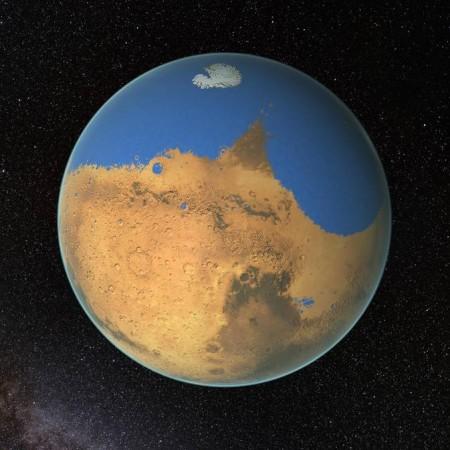
Scientists at NASA have found new evidence that indicates the red planet had more water than Earth's Arctic Ocean billions of years ago. This appears to be a step forward in their research, which is aimed at establishing ancient Mars once had life on it.
After observing water signatures in the Red Planet's atmosphere for six years, the United States-based space agency discovered that about 4.3 billion years ago a huge water body, at least 137 meters or approximately 450 feet deep, had covered half the low-lying plain of Mars' northern hemisphere.
"Our study provides a solid estimate of how much water Mars once had, by determining how much water was lost to space. With this work, we can better understand the history of water on Mars," said Maryland Geronimo Villanueva, a scientist at NASA's Goddard Space Flight Center in Greenbelt, according to the press release by NASA.
"The existence of a northern ocean has been debated for decades, but this is the first time we have such a strong collection of data from around the globe...Our results tell us there had to be a northern ocean," principal investigator at NASA's Goddard Center for Astrobiology Michael Mumma said, according to The New York Times.
The scientists reached to the conclusion after examining two different forms of water found on Mars. One was H2O and the other was HDO, in which hydrogen was replaced by a heavier form called deuterium - which is eight times the amount found on Earth.
"By comparing the ratio of HDO to H2O in water on Mars today and comparing it with the ratio in water trapped in a Mars meteorite dating from about 4.5 billion years ago, scientists can measure the subsequent atmospheric changes and determine how much water has escaped into space," the release said.
Earlier research on Mars' Gale Crater by the Curiosity rover had also suggested existence of water on the planet, but not in as much quantity as claimed by Mumma and Villanueva.
"The more water was present — and especially if it was a large body of water that lasted for a longer period of time — the better the chances are for life to emerge and to be sustained," chief of the atmospheric experiments laboratory at the Goddard Space Flight Center Paul Mahaffy said.
Several scientists who held discussion on the existence of water on Mars agreed that it must have existed for millions of years, but they were not yet clear how the huge mass of water "sustained and replenished".
"For open lakes to remain relatively stable for millions of years — it's hard to figure how to do that without an ocean. Unless there was a large body of water supplying humidity to the planet, the water in an open lake would quickly evaporate and be carried to the polar caps or frozen out," said Ashwin Vasavada, project scientist of the Curiosity rover mission at the Jet Propulsion Laboratory in Pasadena, California.
The existence of water on Mars indicates life existed on the red planet for a long period. "With Mars losing that much water, the planet was very likely wet for a longer period of time than was previously thought, suggesting it might have been habitable for longer," Mumma added.










